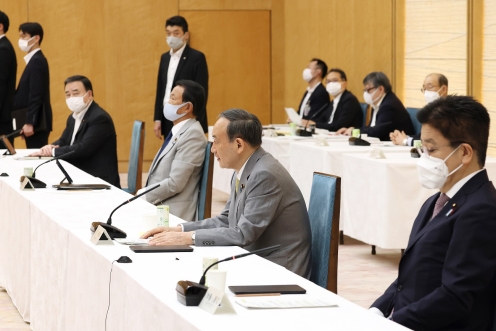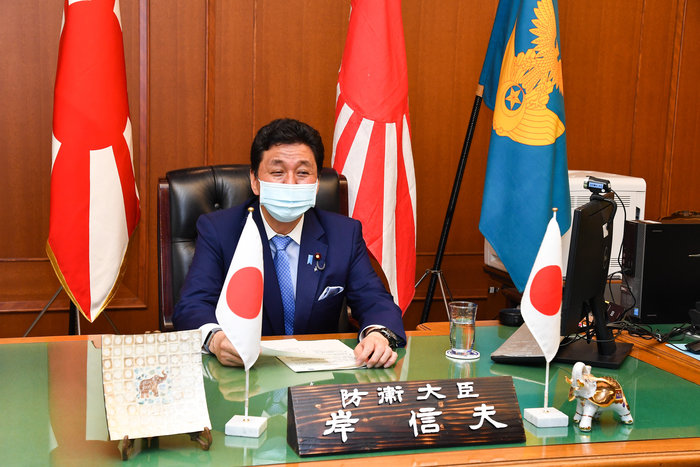
June 2021
This month’s edition of Policy Radar covers developments in Defense, Energy, Technology, Healthcare and Finance. Starting this month, Policy Radar will include a Monthly Focus where we analyze one key policy at length.
Month Focus: METI to Expand Financial Support for Semiconductor Industry
The Japanese government will prioritize the nation’s semiconductor industry amid U.S.-China decoupling in the tech sector and a global shortage of the crucial electronics component. The government will support the production of advanced semiconductors, according to this year’s growth blueprint, with METI funding the development of production facilities and the research and development of manufacturing technologies. The goal is to shift chip-making supply chains back to Japan and buffer against a recent semiconductor scarcity. Policymakers worry that heightened friction between the U.S. and China could affect Japan’s access to semiconductors.
The government hopes to expand support programs beyond the current ¥200 billion ($1.8 billion) to attract the largest semiconductor developers into Japan. METI’s semiconductor strategy plan calls for Japan to hold about 40% of the global share in next-generation power semiconductors by 2030, through capital expenditures until 2025 and the promotion of local production sites. The strategy also mentions the renovation of existing factories. With this, the government hopes to tie global companies with domestic players to increase Japan’s competitiveness and acquire foreign expertise. The blueprint was presented at the Growth Strategy Conference, headed by the Chief Cabinet Secretary Kato Katsunobu.
METI now sees semiconductor chips as essential for technological development and for its 2050 decarbonization targets. It will categorize semiconductors as global strategic goods so that more resources and public assistance can be directed toward the industry. This would be the first time that semiconductors are treated outside normal industry policies.
METI Minister Kajiyama Hiroshi said at the beginning of the month that semiconductors are an indispensable foundation for people’s lives, and he expressed his willingness to promote a framework for public-private sector collaboration.
METI recently announced the recipients of subsidies to manufacture advanced chips technology through the Project for Research and Development of Enhanced Infrastructures for Post 5G Information Communication Systems/Pioneering Research. These include Showa Denko Materials for the development of technology, Sony Semiconductor Solutions for edge computing and TSMC for 3D packaging technology for high-performance computing.
Want to Stay Informed?
Sign up for monthly updates on the latest political developments impacting your industry in Japan:

The ministry, through the New Energy and Industrial Technology Development Organization, will also support TSMC with ¥19 billion for the company’s new R&D base in Tsukuba, Ibaraki Prefecture, covering about half of the project’s total cost. However, the company will have to conduct the project with 20 Japanese companies, including materials and producers like Asahi Kasei, Shin-Etsu Chemical, Mitsui Chemicals and Sumitomo Chemical. The construction of the R&D facility will start this summer, with a goal of opening the facilities as soon as next year.
On the other hand, METI has also established the Automotive Semiconductor Supply Chain Working Group under the Automotive Council to provide measures to guarantee a stable supply for semiconductors used in cars. The ministry is also revising policies on employment through the creation of certificates for digital experts demonstrating their digital capabilities and training venues. The goal is to attract top talent to Japan.
At the parliamentary level, the LDP has launched its own parliamentary group focused on the semiconductor industry. The group will look to propose policies concerning government incentives, subsidies and taxes for the ailing industry. It is headed by Amari Akira, chairman of the LDP’s powerful Tax System Research Commission, with former Prime Minister Abe Shinzo and Finance Minister Aso Taro serving as chief advisors. Abe said that semiconductors should be viewed in terms of national security, as they are crucial for all of Japan’s industries. Lawmakers have highlighted the importance of cooperation among the U.S., the EU, South Korea and Taiwan. The group will also consider measures for R&D, as well as regulatory reforms aimed at making the industry more attractive to foreign players. Amari argued that for Japan to move back to the center of the global supply chain, it must work with TSMC, adding that the country has to work with “like-minded” allies. He said that bringing Chinese companies to Japan was out of the question.
METI expects the Cabinet to approve the growth strategy blueprint this month, after discussions between the government and the ruling coalition, including financial measures for the fiscal 2022 budget.
Countries like the U.S. will spend about $40 billion on R&D and manufacturing; China will direct $120 million to semiconductor development; and the EU will devote around $166 billion through its Digital Compass initiative.
It remains to be seen whether Japan can compete with other regions, but it could soon see TSMC building a production facility in Kumamoto near one of Sony’s facilities (TSMC is a key supplier of Sony) to help meet growing demand for car microcontrollers, image sensors, etc. Additionally, METI will cooperate with IBM and Tokyo Electron to strengthen the development of advanced semiconductors through a framework devised by the ministry.
These are two major wins for the government after months of active lobbying both IBM and TSMC, and a glimpse of hope for the Japanese semiconductor industry.
Defense:

Defense Minister says Japan ready to increase defense budget by over 1% of GDP
Defense Minister Kishi Nobuo has called for the country to increase their defense capabilities at a more aggressive pace than in the past. Kishi cited the growing power of the Chinese military, as well as the need to develop capabilities in new aspects of war, such as cyberwarfare, electromagnetics and space. Kishi also talked about increasing the presence of the Self-Defense Forces in the Nansei Islands, a group of islands which have vast strategic importance due to its proximity to the disputed Senkaku Islands. He also said that the country is ready to scrap its informal rule of capping defense spending below 1% of GDP. In the interview, the defense minister also said that the government is still discussing the possibility of Japan developing the capability to strike enemies in the face of an incoming enemy attack, noting that Japan’s interception capabilities may not be enough to protect the public. Policymakers from the ruling LDP have been pushing for an increase in the defense budget. The National Defense Division and the Research Commission on National Security, both within the LDP, have agreed to seek greater spending for military equipment for fiscal 2022 and 2023. Both groups of lawmakers have also agreed to issue a recommendation to increase research and development spending for next-generation fighter aircraft. Recommendations are expected to reach the prime minister some time soon.
Langley Insight: This news comes a month after a joint statement by U.S. President Joe Biden and Prime Minister Suga Yoshihide agreed to bolster “national defense capabilities to further strengthen the alliance and regional security”. The U.S. has previously urged Japan to increase military spending to about 2% of GDP, but scrapping the symbolic rule is likely to generate pushback from other nations in Asia, notably China and South Korea.
Energy:
Japan restricts use of foreign tech in critical infrastructure sectors
The Japanese government will implement new regulations that will require critical infrastructure operators to consider national security when procuring foreign-made equipment. As demonstrated by the recent Colonial Pipeline ransom attack, which saw the shutdown of a major fuel pipeline in the U.S., vulnerabilities in critical sectors can threaten national security. With the potential for cyberattacks growing as telecommunications and public utilities increasingly depend on IT to control their facilities and incidents of data leaks from Chinese-made telecommunications equipment, the government is looking to mitigate economic and national security risks. Identifying 14 industry sectors, including telecommunications, electricity, finance, and healthcare, as critical infrastructure, the government will require private companies in these sectors to look into their use of foreign equipment or services, such as cloud storage and server connections, and will suspend or cancel their licenses if they do not comply with standards. By the end of 2022, the government will revise the basic business requirements for each sector to include consideration of security concerns as a new condition. Details of the standards and regulations are to be outlined in coming government ordinances and guidelines.
Technology:
Parliament approves set of digital laws, Digital Agency to be established in September
The Japanese Diet has enacted a set of laws to establish a new Digital Agency by September 2021, completing one of the Suga administration’s key policies after months of discussions between the party and the Cabinet, spearheaded by Digital Minister Hirai Takuya. The bills will replace the country’s 20 year-old IT Basic Law with new legislation. They also standardized IT systems at the local and national levels through the introduction of common nationwide rules that will create a shared-experience across different levels of government (i.e. public services) and protect personal data. The legislation also requires the Digital Agency to pass further privacy/security measures to prevent data leakages and so on. The legislation also removes hanko and physical document requirements for official documents, allowing instead the use of digital data. To do so, the passed legislation promotes the further use of the My Number card as well as its linkage with other official documents, such as driving licences or savings account information. The Digital Agency will be staffed by around 500 officials, including 120 recruited from the private sector. The agency will be headed by a Cabinet minister appointed by the prime minister, and an administrative official coming from the private sector.
Healthcare:
Japan looks to issue official vaccine passport this summer
In response to the growing push for the creation of a single global vaccine passport, the Japanese government looks to issue official certificates starting this summer to vaccinated residents traveling abroad. While the government has yet to publicly confirm plans to introduce vaccine passports, an interagency team formed by the Ministry of Foreign Affairs and the Ministry of Health, Labour and Welfare, and headed by Chief Cabinet Secretary Kato Katsunobu, is discussing plans to issue paper certificates this summer, followed by a digital smartphone app version by the end of the year. Local governments, which hold information on residents and are responsible for the administration of vaccines, will issue the passports. The central government is expected to link these certificates to a national vaccination record system to guarantee accuracy. The government looks to model its passports on the EU Digital COVID Certificate scheme, which exempts the holder from testing and quarantine measures. Whether vaccinated travellers from Japan can be exempted from quarantine upon arrival in a foreign country and vice versa will depend on the Japanese government’s negotiations for reciprocal entry arrangements with other countries.
Langley Insight: Although Japan had initially lagged behind other high-income nations in vaccinations, with vaccinations in corporate workplaces and universities to start on June 21, the rollout has accelerated. The daily COVID-19 vaccination rate is nearly that of the U.K. and France. The move to introduce an official vaccine passport is anticipated to further normalize economic activity and has been welcomed by organizations such as Japan Foreign Trade Council. The Health Ministry has taken a cautious stance, indicating that the government will take measures to respect people’s freedom and choice in receiving vaccines. Nevertheless, with the G7 nations promoting a framework for recognizing each other’s vaccine passports, Japan cannot afford to fall behind again. As the government prepares to launch the Digital Agency in September, the operational success of the national Vaccination Record System (VRS) project, which will facilitate cooperation between national and local governments in managing the vaccination certificates, will prove critical. It will possibly determine the success or failure of Prime Minister Suga’s key policy to accelerate Japan’s digitization.
Finance:
Government considering to give out new cash handouts to households hit by the pandemic
The Japanese government is considering extending new cash handouts to households undergoing severe financial strains because of the coronavirus pandemic. Monthly handouts could total around ¥100,000 for households composed of three or more people for three months, while single-member households are likely to receive ¥60,000 and two-member households around ¥80,000. Applicants will have to meet several conditions, such as not possessing deposits or savings worth over ¥1 million; those on welfare plans would not qualify for the handout either. This measure is similar to that passed last year, where the government gave ¥100,000 to each resident (including foreign residents) after Komeito pressed to change the target recipients to residents, rather than households. It remains to be seen whether Komeito will exert similar pressure for this year’s handout. The government’s idea is to use ¥50 billion from the current fiscal year’s budget. The government had also provided interest-free and low interest loans to vulnerable households and companies.
Japan enacts a package of revised laws to reform traditional financial services
The House of Councillors approved and enacted by a majority a package of amended financial laws, implementing significant changes to the current regulatory framework for payment and fund transfer services in Japan. The package includes: revision to the Act on Special Measures for Strengthening Financial Functions, which will see the establishment of a subsidy system to support mergers and reorganizations of regional financial institutions; revision to the Banking Act, which will greatly ease restrictions on the scope of banks’ business and investment from the previous investment limit of 5% (15% for holding companies) to allowing 100% investment into unlisted companies that contribute to the regional economy; and revision to the Financial Instruments and Exchange Act, which will relax entry requirements for foreign investment funds that have been registered with overseas authorities and have operational experience in Japan.
Langley Insight: The package of financial amendment acts seeks to revive the economy, which has been battered by the pandemic and declining population by fortifying financial functions. These measures will see an increase in both domestic and foreign licensed money transmitters, along with an expansion of new non-bank entries into traditional banking services. With the government committed to expanding Japan’s role as an international finance hub, further regulatory changes favorable to new entrants are expected, opening up opportunities for various IT and financial service providers.
Langley Esquire provides a full range of government & public affairs consulting services, including policy & media monitoring, stakeholder mapping, strategic communications, procurement and government relations. We craft unique solutions tailored to meet our clients’ needs across industry sectors including technology, energy, healthcare, finance, transportation & infrastructure, defense, and beyond.
As the outbreak of the COVID-19 pandemic continues to bring unprecedented impact around the world, public and private sectors rush to adapt to a rapidly-changing global environment. While there is uncertainty for what lies ahead, new opportunities emerge for public-private partnerships. Every day brings new insights, opportunities, and technology that affect Japanese politics, business, and society.
If you are struggling to make sense of policymaking and engage your key stakeholders across government, media, and academia, contact us to learn more about what we can accomplish for you.
Be the First to Receive Future Updates!
See Related Content:

Digital Agency Overview: Japan’s Digitization Push Gets in Gear
The Digital Agency has been officially launched with the aim of updating the country’s outdated digital infrastructure. Will this time be different?

Timothy Langley Featured In Nikkei Asia On New Digital Agency
Langley Esquire CEO Timothy Langley was quoted in Nikkei Asia on Japan’s incipient digital agency and the challenges it will face — both from the private sector and other government bodies.

Japan Politics Now – May 2021
In Japan Politics Now, we aim to bring you Japan’s latest political developments, both foreign and domestic, and explain in brief why they matter.
